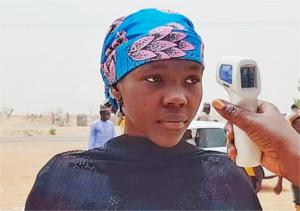WHO scales up support as Borno State confirms COVID-19 Outbreak
Maiduguri, 22 April, 2020 - Following confirmation of the first COVID-19 case in Borno, the World Health Organization (WHO) and partners are moving rapidly to help health authority in the state to identify, test and treat cases in order to prevent and control further outbreak of the disease.
The first case of COVID-19 was reported 51 days after the country declared an outbreak of COVID-19 disease. As at 20 April 2020, in Nigeria 665 cases have been confirmed in 25 out of 36 States, including Borno, and the Federal capital Territory,
The Chairman, Borno State committee on the Prevention and Control of COVID-19, Alhaji Umar Usman Kadafur, disclosed that the index case a 56-year-old citizen of Borno who was brought in from Pulka with symptoms of severe respiratory disease before he gave up at the University of Maiduguri Teaching Hospital.
“The index case is a health worker in Pulka, Gwoza local government area who was managed for 10 days in a health facility before being referred to the University of Maiduguri Teaching Hospital) where he was on admission for three days during which a sample was collected and tested positive for COVID-19 on 18 April 2020. The patient died on same day,” says Alhaji Kadafur.
The Public Health Emergency Operations Center (PHEOC) has been fully activated for the response. Preparatory for response, WHO had trained State and local government area (LGAs) Rapid Response Team (RRT) teams. While continuing insecurity has made surveillance and response challenging, contacts have been identified and are being followed-up. WHO has line-listed over 103 contacts linked with the index case and are on self-quarantine. Details of the contacts indicate that 62 are in Maiduguri while 35 are based in Pulka, Gwoza LGA.
Speaking on the outbreak, Dr Collins Owili, Emergency Manger in the northeast said, “Prior to the index case of COVID-19 in Borno, WHO has been providing technical support to ministries of health in Borno, Adamawa and Yobe states in active surveillance, risk communication, contact tracing and logistics among other preparations for response to confirmed cases.
With the technical support from WHO, the Infection, prevention and control (IPC) teams are currently decontaminating health facilities where the index case in Borno state was admitted,” Owili added.
Through its mobile health clinic (hard-to-reach teams), traditional and religious leaders including 229 religious leaders in 23 LGAs, nomadic settlements, and people in security compromised areas of Borno have been educated on the importance of social distancing, use of local hand sanitizers and Face Masks as part of preventive behaviours for COVID-19.
Risk communication interventions including motorized campaign, house-to-house sensitization are taking place in Gwoza LGA where contacts and alerts of suspected cases have been reported.
Borno state is at the heart of a humanitarian crisis in the north-east of Nigeria where almost 7 million people need health assistance and 60% of health facilities are functioning partially or not at all.
Detecting and responding rapidly to suspected cases of COVID-19 is vital to controlling the outbreaks, which can spread rapidly in areas where access to safe water is limited, hygiene conditions are poor and populations are weakened by food shortages. Intense efforts by national and partner response teams in Borno State over the last year mean surveillance and monitoring capacity have been greatly strengthened, enabling early detection of this outbreak.
Technical Contacts:
Dr Owili Collins; Email: oliwic [at] who.int; Tel: +234 810 003 3653
Dr Chima Onuekwe; Email: onuekwec [at] who.int; Tel: +234 803 535 4876
